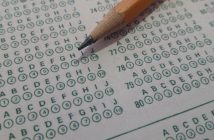
Editor’s Note: The following interview originally appeared in Chinese in jingkids magazine.
Rachael Beare comes to Keystone Academy from The Hotchkiss School, one of the top boarding schools in New England, where she was the Dean of Admissions and Financial Aid from 2008-2012. She is now the Dean of Admissions for Keystone Academy.
Beare’s career in admission and financial aid spans more than 20 years and has taken her to many different day and boarding school environments in the United States, including Lakeside School, a leading day school in Seattle, Washington, where she was the Director of Admissions and Financial Aid for 10 years; Phillips Exeter Academy in New Hampshire; Deerfield Academy in Massachusetts; and Loomis Chaffee School in Connecticut, her high school alma mater.
Beare is also a founding member of the Board of Directors for the Association of Independent School Admission Professionals (AISAP) and a graduate of Amherst College with a B.A. in English, magna cum laude. She earned her Ed.M. from Harvard University’s Graduate School of Education.
jingkids spoke with Beare to get her insight into how American universities select and evaluate applicants from China as well as some of the distinct qualities of the students themselves.
jingkids: Based on your many years of experience working in admissions for American schools, what do you think is the biggest difference between Chinese Mainland students and American students? What qualities do you look for in applicants?
The approach to education in China is very different than in the US. Chinese students are used to deferring to their teachers and seldom ask them questions. On the surface, it may appear that Chinese students are less curious that students in the US, but in reality, it just takes a bit more effort from the admissions officer to uncover that curiosity. I am looking for students who have interesting personalities, who have a strong sense of self and cultural identity, and who have well-defined interests that they hope to pursue.

JK: What applications materials were required at the schools that you worked for in the US?
In general, schools will ask for school transcripts, recommendations from two teachers, essay responses, a standardized test and an interview. Some schools will also request an additional recommendation, a piece of graded writing, or parent questionnaire.
JK: How do US schools evaluate applications from Mainland China? Have you encountered any issues when processing applications?
It is fairly common for schools to consider all applications from a particular country as a group to see how they compare to each other, especially if they have several students applying from the same school. The most significant concern amongst schools and colleges in the US is whether the information they are receiving is honestly presented and representative of a student’s work. Many schools have had incidents where documents were falsified or misrepresented.
JK: How do schools handle these cases? Do schools add any new admission procedures to deal with these issues?
In one of the schools where I worked we rescinded a student’s acceptance when it became clear that the academic records where false. In order to prevent these incidences, the school, on occasion, will contact schools directly to confirm that the information we received was accurate.
JK: Do US boarding schools and universities have a quota for international students? If so, does this quota include those Chinese students who are already studying in the US?
While schools do not generally work with quotas for specific groups of students, they may have general goals in mind for diversifying their student population. Most schools like to have a healthy mix of students from as many regions as possible, but not too many from any one region or country. I’ve worked for four US boarding schools. Those schools were dedicated to having talented students from all regions of the US and several countries around the world. They want to enroll students who bring a broad range of talents and experiences because they feel that this diversity enhances the richness of the academic experience of all students.
JK: You’ve seen many Chinese students in US schools. What qualities do these students have that allow them to adjust to new environments?
Many of the students who come to the US from China have an outstanding foundation in math and science and excellent memorization and test preparation skills. It can be a challenge for them, however, to get used to an environment where they are asked to express their own thoughts and ideas about the material they are presented. After they adjust, these students are now capable of establishing relationships with their teachers or being able to pursue their own questions about particular topics. Those students who are curious, outgoing, independent thinkers, and are willing to step outside of their comfort zone from time to time are able to adapt most quickly to this new environment and way of learning.
JK: In the future, do you think that students will start coming to China to obtain a better education? What will China need to do to get there?
While there are elements of the education system in China that are very strong, it is a system that rewards intense study and individual success, over innovation and collaboration. I have friends and colleagues in China who are hopeful that one day China will be able to produce someone like Bill Gates or Steve Jobs. In order to get there, I think that the approach to teaching and learning will need to change. I think that when China becomes a place that is contributing to the next wave of innovation in the world, people will want to come here to study and to be a part of that creative process.



